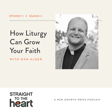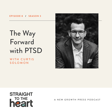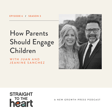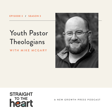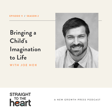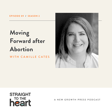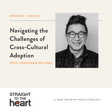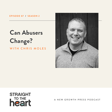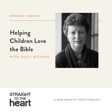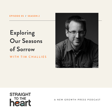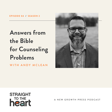Partnering with Jesus in Ministry
00:00:00
Speaker
Mark 11, here's a passage everybody knows, but it's just exquisite. Now come to me, you're her weary. I'll give you rest. And then you have this picture of partner with me, with this yoke. But it's just a really strange picture because he does all the heavy lifting.
00:00:18
Speaker
but he meaningfully allows us to be a partner with him. It's just, who would have thought? Sometimes I feel like a kid pushing a plastic lawnmower as I'm doing ministry and my father's doing all the work, but he doesn't look at it that way. He thinks of us as partners.
Introduction to Season Two of 'Straight to the Heart'
00:00:38
Speaker
I'm Rush Witt, and you're listening to season two of Straight to the Heart, a podcast from New Growth Press. Each episode includes thought-provoking conversations with leading Christian writers and thinkers. We hear who they are, what they believe, how they approach their work in ministry, and the moments and people who have changed their lives. In Straight to the Heart, we go beyond the books to connect with the remarkable people behind them.
00:01:07
Speaker
This is the first episode of our second season. Thank you for listening to, subscribing, and sharing straight to the heart with others.
Interview with Ed Welch: Early Life and Faith
00:01:17
Speaker
Today, I talk with a true hero of mine, author and counselor Ed Welch. Ed has been counseling for over 40 years and written extensively on the topics of depression, fear, and addictions.
00:01:30
Speaker
In this episode, we talk about the early years of Ed's life and faith in Christ, what it means to make counseling beautiful, and how to help people in the midst of grief and suffering. It's a phenomenal start to season two. This is Straight to the Heart. I really appreciate you doing the podcast with me.
00:01:52
Speaker
Yeah, you're very welcome and I'm certainly pleased to do it. Yeah, it's an important thing to me because you are kind of hero to me. I know that's strange and I don't let on. Well, it's obvious, I think. And I don't let on when we're around places.
00:02:18
Speaker
And, uh, but yeah, for sure, just because of the influence of, uh, your writing and counseling and CCF. And I went to seminary super green. I didn't know anything about anything about anything. What a fun way to go to seminary.
00:02:33
Speaker
Well, I guess. I mean, I didn't know what I didn't know, but it wasn't long after that that I was really helped and blessed by a strong surge of CCF counseling, nuance, wisdom, help.
00:02:50
Speaker
you, Paulison. And so I'm really interested to know more about you as a person and in particular, maybe some of how you were raised and how you came to faith in Christ.
Influence of Family on Ed Welch's Counseling Approach
00:03:03
Speaker
My parents were believers, they were thoughtful believers, which was a great, great gift to me. They were thoughtful and they lived out their faith in their own particular ways. So I have this unusual story
00:03:20
Speaker
where I knew people loved me. I watched parents. I never thought for a moment that they were going to separate, even though they were very, very different people, which actually was also a fine part of my story. I saw people who rightly should not have been together because they were so dramatically different who they intentionally cared about each other and worked through differences and disagreements.
00:03:46
Speaker
So I experienced that protected home and loving home, which I think today in some ways
00:03:55
Speaker
There are advantages and disadvantages to our backgrounds. The advantages is that I think as a counselor, it gives me more freedom to hear somebody and know someone. And it's not necessarily always sort of colliding with similar features in my own life that distract me. So I have appreciated that as a counselor.
00:04:19
Speaker
And I certainly appreciated my parents. My own story is...
00:04:27
Speaker
one where I knew of Jesus as long as I can remember. I knew Bible stories as long as I could remember. And I believed that they were all true. I believed Christ had come, I believed He died, He died for sins, and He was living. But I never followed Him. To me, the distinction between knowing the truth and following the person, that was relatively clear in my own mind. I think Syria was
00:04:57
Speaker
was engaged by that. She wants to find something on the web.
Ed Welch's Faith Journey in College
00:05:00
Speaker
Growing up in a Christian home, I always knew Christ and scripture. But relatively early on, I understood the clear distinction between knowing the truth and believing the truth
00:05:17
Speaker
It was truth. Christ came. He died for sins. He was the risen King. I knew that truth, but it became more and more clear to me that I didn't follow the person. And those things become a bit more clear in adolescence and teenage years, but it was clear to me.
00:05:39
Speaker
I wasn't reacting against the church that I grew up in. The Christians I knew, they were really fine people. I liked them. Some of them knew that I was headed in a different direction than they were, and sometimes they confronted me in unusual ways, but I thought that that was all fair game because I probably needed, I did need to be confronted.
00:06:06
Speaker
But I didn't follow Jesus simply because I love things in the world more than I love Jesus. It was very clear to me. It wasn't until my last year in college. I'm sure there are lots of different circumstances. There were a lot of circumstances associated with it. But my last year, really my last month in college,
00:06:26
Speaker
I was converted through reading the scripture, where there was a movement of integrity, I think, in my heart. I wanted to do the things right. I wanted to be open. I don't think people use the word authentic and genuine as much in those days, but I wanted to be honest with who I was. So I think that was some of the spiritual momentum that led me to
00:06:52
Speaker
reading Scripture and against you and you only have I sinned. That's what came out of it. I can't tell you what the Scripture was. But at that point, I found Scripture to be so powerful in my life, I had already
00:07:05
Speaker
apply to different graduate schools. I was probably headed toward working with children, and the question, how do children learn? And how don't they learn? It was an interesting question to me. So I was headed in that direction.
Transition from Psychology to Biblical Counseling
00:07:21
Speaker
But when I saw how powerful Scripture was, I said, no matter what I do, I want to know more about this. And so I went to Scripture. I mean, I went to seminary simply to study the Bible. I wasn't thinking vocationally.
00:07:34
Speaker
I just, the scripture had made such a difference in my own life. I wanted to know it better. And where did you go to college? Did you say that? Went to the University of Delaware. I was involved in athletics there. I swam when I was younger. So that means you were a blue hen?
00:07:56
Speaker
I was a blue hen. I was never utterly ashamed by the mascot, but it always seemed like an unusual one. For me, it was probably a good place to go for various reasons. I swam in the swimming team there.
00:08:16
Speaker
which I think was one of the things the Spirit used were issues of what do you love? What's most important to you? I recognize that athletics were really not that big a deal. And it was important and helpful to go through that process.
00:08:34
Speaker
And then what was your introduction to biblical counseling and in such a way that it would carry you forward with such focus on counseling and training and all the rest? I actually was a psychology major in college, but I'd lost interest in it because it just didn't seem like it had any particular answers. So I found myself more interested in the hard science of psychology.
00:09:04
Speaker
anatomy, physiology, brain science, things like that, which I ended up pursuing a little bit later. But I lost interest in it because knowing people and helping people did not seem to be part of the undergraduate curriculum. But I had those interests. So when I went to seminary, I was thinking, I just want to study the Bible.
00:09:27
Speaker
Well, at the time, they also had a biblical counseling course. It was probably one of the first biblical counseling courses that would show up in the seminary curriculum. There was a person who was actually counseling at CCF, which is where I work now, as well as being a seminary instructor. And I was flabbergasted. I was stunned.
00:09:49
Speaker
to see how scripture just speaks to so much in life that I for some reason had not anticipated. So it was
00:10:02
Speaker
It was, it suited me. It had those people interests. Who are people? And why do we struggle? And how do we change? And how do we grow? What's the good life? Those kinds of questions, they were met with Scripture that offered much more than I anticipated. So I was smitten. And I also had an opportunity to actually observe counseling at CCF as part of the seminary curriculum for a semester. And same thing.
00:10:32
Speaker
I thought at that moment, if I could decide, if I could choose what I wanted to do, this is what I would want to do. Nothing we can choose what we want to do. We can have our preferences and they can go different directions. But it turns out that's what I ended up doing after a bit of a detour in graduate school after seminary.
00:10:51
Speaker
So, throughout that time as you were growing as a biblical counselor, you know, through seminary and then beyond, and then I assume through CCEF, what were some of the, if you think back, the biggest
00:11:07
Speaker
changes or improvements where you saw in yourself or maybe in ministry and counseling a weakness that was revealed and then it was strengthened and changed.
Growth in Biblical Counseling: Beauty and Christ-Centeredness
00:11:20
Speaker
One shift I can't identify because it was just this very gradual unfolding simply to get experience in knowing people and caring for people and
00:11:32
Speaker
learning what is helpful and what's not helpful, and having access to more scripture, being able to speak about Jesus more clearly, and then to move from having a deeper well of content
00:11:52
Speaker
To them, I think this was a, not a shift perhaps, but it was an era. How can that content be beautiful? How can it be attractive? Scripture is not merely content, it's, and we picked this up in the wisdom literature. The wisdom literature seems to be really bent on, if this is beautiful content, and it is, then how can we make it as attractive and inviting and wooing as possible?
00:12:21
Speaker
So I think there was that particular term to how can this be offered to another person in a way that
00:12:31
Speaker
It is attractive. It's good. It's the gospel. How can this sound like good news? So I'm still in that particular era, but it took, I think, for me, the building of the content first to see how the content really was beautiful in its treasure chest. And how can we not go in there and investigate and enjoy it together?
00:12:55
Speaker
to house this beautiful. And then I think perhaps the movement and more clarity to determine to know nothing but Christ and Him crucified. How can my care for another person ultimately be animated by my knowledge of that person?
00:13:17
Speaker
And how can somehow who that person is and what he's done, how can that be central to our journey together? For my own counseling to be not merely, here are the right things to do, here are wise things to do, but here's the one we know and we follow and we respond to.
00:13:44
Speaker
And we know that He is the one who will never leave us, never forsake us. So that's where there are turning points in that. It was probably more of a gradual evolution, which
00:13:56
Speaker
When your life's question is, how does the Word of Christ speak into everyday life? The pleasure of that is there's always more, there's always more, there's always greater depths, there's always farther reaches, there's always much more to learn. So that's one of my great pleasures, that the Spirit grows us. He's alive in us.
00:14:23
Speaker
And sometimes you can't see it day to day or week to week or year to year, but that particular momentum has been a real joy to me.
Small Book Devotions Bundle: Addressing Fear, Anxiety, and Shame
00:14:33
Speaker
Do you know about the Small Book Devotions Bundle by New Growth Press? You can visit newgrowthpress.com to learn more. The Small Book Devotions Bundle includes four books, one by Paul Touches and three by Edward T. Welch. Those books are A Small Book About a Big Problem, A Small Book for the Anxious Heart, A Small Book for the Hurting Heart, and A Small Book About Why We Hide. Each book unpacks these topics as 50-day devotionals.
00:15:03
Speaker
While many books exist on fear or anxiety or shame, promising to help men and women manage their struggles with methods and formulas, we don't want to put a band-aid on our fear or anxiety or our hurting hearts. Rather, we want to bring these troubles to Jesus, relying on His word. This small book series aims to do just that. And you can learn more about all four books in the Small Book Devotions Bundle by visiting NewGrowthPress.com.
00:15:37
Speaker
Yeah, I'm enlightened and encouraged by what you're saying about counseling being beautiful. And I think it's because in my relatively brief experience, there is such an ease at which counseling can, because it's focused on helping people to some degree, it's at least perceived as being focused on solving problems, that there's a tendency for it to become very utilitarian, practical,
00:16:04
Speaker
and the beauty of biblical counseling and soul care ministry can be lost. So can you say some more about how you find yourself making the truth beautiful in your ministry to other people through discipleship or counseling?
Making Pastoral Care Beautiful: Gentleness and Compassion
00:16:25
Speaker
Let me get to that in a second. You got me thinking of something else first, and it has to do with sort of growth and movement.
00:16:35
Speaker
I can remember, probably 10 years into my time as a counselor at CCF, I encountered a definition of pastor. And it was someone who has an interest in the long-term care of a person's soul.
00:16:57
Speaker
And what captured me there was the long term. And I think the reason it captured me is I suspect that there was a bit of a consultant
00:17:09
Speaker
I love the people I've had opportunities to know and speak with, but I suspect there was a kind of consultant, an advice giver, and to move from advice giver to a pastor who loves the person who wants the very best for them and wants to know them in their very souls, and then walk with them. That particular image, walking with them,
00:17:39
Speaker
whether it's for weeks or months or whatever it might be, to be able to walk together in this sort of wonderful journey of hearing scripture, of praying that would be increasingly alive in our soul.
00:17:55
Speaker
and anticipating that the Spirit was going to speak to us in very difficult places and waiting for Him to speak well and meaningfully and deeply to us. So I do think that that was a particular movement. And a consultant is not going to be interested in beautifying his words or her words. Here's what you need to do, and off you go, and I'll move on to the next person. But a pastor,
00:18:25
Speaker
a pastor who has been pastored, pastored by other people and pastored by Christ, all of a sudden there is this, how can I surprise this person with a gentleness that they weren't anticipating at this moment? How can we together
00:18:48
Speaker
find an invitation here well here's mark 11 here's a passage everybody knows but it's just it's exquisite now come to me you're her weary i'll give you rest and then you have this picture of you partner with me with this yoke but it's just just a really strange picture because he does all the heavy lifting
00:19:09
Speaker
but he meaningfully allows us to be a partner with him. It's just, who would have thought? Sometimes I feel like a kid pushing a plastic lawnmower as I'm doing ministry and my father's doing all the work, but he doesn't look at it that way. He thinks of us as partners. And then he talks about his humility.
00:19:33
Speaker
gentle and humble of heart. You know, I guess to beautify, beautify pastoral care is simply to understand scripture and allow scripture, to allow us to pause at scripture and say, do hear what we're saying. This is, what a beautiful invitation. This is the one who walks along with us.
00:19:59
Speaker
So Mark and Matthew 11 would just be one passage that comes to mind. I don't want to riff on this too long, just sort of wandering around in my own mind now. Zechariah 3 is a picture that I've enjoyed.
00:20:22
Speaker
where we find ourselves this priest Joshua who represents us. All of a sudden he finds himself in the heavenly courts and he's not attractive. His garments are obviously just ratty and torn.
00:20:40
Speaker
And Satan comes and accuses. Joshua, how can you be here? Kick him out. Have him kicked out. And then Jesus comes as sort of the angel of heaven there. He simply says, put new garments.
00:21:01
Speaker
on Joshua, put new garments on Joshua. And I think about those priestly garments in Exodus. Make garments to give them dignity and honor. That's the first time you've ever seen those words in Scripture addressed to a person or a battered person. There's no dignity and honor in fallen people, but all of a sudden you see this work that Jesus is going to do. He's
00:21:28
Speaker
In our connection to Him, we will know dignity and honor, and it will be represented in part by these beautiful robes that He gives us, ultimately these priestly robes. And one of the funny parts of that Zechariah 3 passage is Zechariah, who is an observer of this mission.
00:21:48
Speaker
No, he's in the heavenly courts. And when Isaiah was in the heavenly court, he falls down as if he's dead because of the holiness of God. But Zechariah, having seen more of Jesus at work, it's like he pipes up. He's not part of the picture at all, but all of a sudden he pipes up and says, you know, put a priestly turban on him. In other words, the garment is not quite done. Basically he said, put a crown on his head. That's what the priestly turban is. But what am I doing?
00:22:18
Speaker
just borrowing some of these beautiful pictures of Scripture that identify who we are and what Christ has done. I suspect some of it also comes from the way the Spirit confronts me in my life. Rush, I don't know how it works in your own life. I'm a little embarrassed to say this, but I would say the Spirit confronts me once or twice a year
00:22:45
Speaker
And when I say confronts me, it's not that I confess sins once or twice a year, but once or twice a year, he usually confronts me. I find myself undone by something that I've done, typically has something to do in my relationship with my wife. And she might not think that much of it. It wasn't this
00:23:07
Speaker
brandyosechnicolor sin necessarily it was simply there was a conviction associated with it that was that was enduring you know people talk about mortification of sin and and i've come after after getting the knack of it i came to really enjoy it and look forward to it but then it then after i don't know after the first 10 episodes like that
00:23:33
Speaker
I did recognize the gentleness with which the Spirit came to me. He came to me with one thing, twice a year, not one new thing every single day, but one thing and gave it to me. And the gentleness with which I was given, it
00:23:57
Speaker
It was the perfect compliment to my soul being undone. You know, sort of a woe is me. And who is my God? That he would care about me this way.
00:24:09
Speaker
and walk with me in this way, and be jealous for my soul in this way, and doing it, even though he knows a thousand of my sins, to have this kind of patience and just speak of this one. So I suspect that's part of it. Having, I think that's beautiful. It's attractive, it attracts me more and more to Jesus. So having had those personal experiences,
00:24:37
Speaker
I guess it can't help but how you want to invite and move others to similar things. Yeah, no, that's really helpful to me.
Helping the Grieving: Being Personal and Present
00:24:49
Speaker
So I'd like to talk for a little while here about a more recent book of yours called Someone I Know Is Grieving and actually pull on a thread from our earlier conversation.
00:24:59
Speaker
that has to do with the emphasis you were placing on being personal and present with people. And what brings it to mind is we would tend to have a title that's just, I'm grieving, but this is actually redirected to someone who's trying to help.
00:25:18
Speaker
And so I'm curious, what led you to see this as an important topic to bring some wisdom and truth to those who would read it? You just got me thinking about a bunch of different things. Let me mention three of them perhaps. My own growth in Christ, some of it can be captured by the word personal, like you just said.
00:25:43
Speaker
And the way I've more or less defined personal, it's this back and forth. It's knowing being known. It's a person speaking and being affected by that person. So in other words, so many of our conversations we talk about something and
00:26:06
Speaker
And then we use that as a springboard to talk about, okay, here's what I'm interested in. There's not a kind of engagement where, oh, really? You did that? It's sort of people speaking in parallel. That tends to be common. Personal is, I think it was the Psalms that probably made that word come alive. Here's what you do in God's house. The Psalms seem to be
00:26:35
Speaker
They seem to have a preface which is a question where the Lord says, tell me what's on your heart.
00:26:43
Speaker
Tell me what's on your heart. You can talk about sports and other things, but I want to know what's most important on your heart. Tell me about your fears. Tell me about the things that are especially hard. Tell me about the things that are great. Tell me what you're learning about me. So almost all the Psalms seem to be part of this personal responsiveness. The personal God speaks, and we speak to him. This is what's on my heart. It feels like you forsaken me. It feels like you're far away. On and on.
00:27:12
Speaker
so many different ways in. And then he hears us. He listens. He is affected. He is moved by what we say. And sometimes you can hear almost an implicit, well, tell me more.
00:27:25
Speaker
Tell me more, right? I've been struck by Psalm 10 and Psalm 22 recently, especially Psalm 10, where there's this extended section where you can almost overhear the Lord say, give me some details, help me to understand what it is that you're saying and what has provoked these things.
00:27:44
Speaker
So I'm getting to your question about that particular book. We know someone who's suffering. But I do think it has background, which is important. One is that we have a God who is a very personal God, and we get a chance to imitate that in our relationships with other people.
00:28:03
Speaker
I think another part to that is Ephesians chapter 4. It's this dramatic passage where in the Old Testament you have these ministry professionals. They weren't that great necessarily, but you had this priestly class, you had the kings, and then I guess you had the prophets come along in part because the priests and the kings weren't doing that great a job and it was kind of corrective oftentimes.
00:28:28
Speaker
It was more than that, but it was at least at that. So you have the professional class, and then when Jesus comes and the Spirit is given to us, then all of us do the work of ministry. We are all called to ministry. That's where Ephesians 4 is going.
00:28:46
Speaker
that the evangelists and the pastors and others, they train us, they train the body of Christ for ministry, which is another way of saying that it pleases the Lord that when ministry needs to be done in the church, He often uses ordinary people to do sort of His most extravagant work.
00:29:09
Speaker
I know as a counselor, here I am, I'm professional, been trained, I've thought about certain issues a lot, talking to somebody who's struggling with things, try to be helpful, but so often
00:29:22
Speaker
I find when I raise the question, what happened? You're different than you once were. What are the components of that? People might mention me in the midst of it, they're gracious, but inevitably they mention a person who invited them over.
00:29:40
Speaker
They mentioned a time when they felt most alone in the context of a church and wondering if they should ever go back again. Somebody just came and asked them just the right question. How many times has it been people who
00:29:57
Speaker
didn't know they were being used, but they were being personal. They loved well, and they loved simply. So I think that's another reason why this book sort of came about. Nothing new in the book, but we, all of us, are the ones called to do the work of ministry. I think the other strand to it is
00:30:20
Speaker
that we do it so poorly. We can do it well, but that every one of us who has gone through some kind of grief, we have had people say things to us that may be well-intentioned, maybe not, but they've been horribly hurtful. Most of the people I know who have heard those kinds of comments, they more or less overlook them. But you can't hear a discouraging word
00:30:50
Speaker
without it affecting you in some way. So what I would notice with people I've known in counseling is they say, oh, we're not allowed to talk about that here. Because the comments that were made, you sort of get over it, and here's what you need to do, or everything's going to be fine in the end.
00:31:16
Speaker
I'm not allowed to talk about these things. So a person simply goes silent. And if that culture is extended, it moves even all the way into scripture, where in scripture we should be silent. We don't talk to God about these kinds of things. That's what I would see often, and I would see my own mistakes in the way I cared for other people. So those are some of the features that I think
00:31:46
Speaker
make all of us interested in what we are cared, we are called to care for others. This is part of the Spirit's calling in our life, and this is going to be a prominent way the Church of Christ moves forward. Aye yai yai, Jesus help. I want to be a student of this, rather than just sort of dispense these trite comments here and there to another person.
00:32:14
Speaker
So for all those reasons, I think we can say in every generation of the church, we want to grow in how we all care well for each other as we go through suffering. For sure.
00:32:27
Speaker
When someone is grieving, it can be hard to know what to say or do. We want to be helpful, not hurtful, but it's easy to go wrong.
Compassion and Humility in Grief Counseling
00:32:37
Speaker
The good news is that we can learn to approach those who are grieving with the same compassion that Jesus shows us when we're grieving.
00:32:45
Speaker
It starts with humility and listening well and expands into practical support as the spirit leads us. In Someone I Know Is Grieving, Edward T. Welch leans on his many years of counseling grieving people to help readers learn from their compassionate savior how to respond to people's sadness in hard times without advice or trying to, quote, fix it.
00:33:09
Speaker
but to instead hear their story, learn from others' experiences, and depend on the spirit for wisdom for what to say and do. Visit NewGrowthPress.com to learn more about the book Someone I Know Is Grieving, responding with humility and compassion by Edward T. Welch. I've noticed that the subtitle of
00:33:36
Speaker
Your book, someone I know is grieving, keys in on two important topics or key words when it comes to moving toward people in grief. And those words are compassion and humility.
00:33:48
Speaker
And I'd love to hear you describe a little more the role of those two and perhaps even the connection between them when it comes to caring for people who are in the midst of grief. Yes, certainly they are connected. But I think even in Ephesians 4, their humility is highlighted as a related category, but a different one. I think of compassion. I think of
00:34:17
Speaker
Think of how Jesus is moved by the people he encounters. And he goes farther where he does something, which is, you know, that's compassion moving into comfort. Comfort is something we would like to be able to offer to another person. Compassion is something we certainly can.
00:34:40
Speaker
give to another person. So it's when I think it's an expression of love, it's I want this person to be on my heart. I think that's one of the ways I think about it personally. I want their struggle to be on my heart. I want it to stick. I want to remember it. I want to be moved by what it is that they've said. I want to share in it in some way. That's the variety of love that I think compassion is.
00:35:09
Speaker
is trying to get. I spoke to a friend today. It was a small thing. He was doing some extra things at work. He works with me. He was doing some extra things that I was just stunned by.
00:35:29
Speaker
I was very moved by his willingness to do these things. And I've sort of seen behind the curtain, this is, hold it. This is, okay, he's saying, yes, I'm going to do this, but it means this and this and this. And it is his expression of sacrifice and love to the rest of us. And I found myself very moved by what he said and moved by him. And I simply said those things.
00:35:59
Speaker
In one sense, you say, so what? What difference does it make? It's not going to take the burden off of him. But immediately he said, thank you so much for your compassion. Thank you so much for it. I wasn't trying to go through the compassion phase with him. But it's an example of how our care for another person
00:36:26
Speaker
It doesn't come out of dramatic insights. Oh, I got this perfect word for this person and everything's going to be better as a result. It's more public domain responses and compassion is within the public domain. And isn't it true that
00:36:47
Speaker
that so many of us, we know that there are certain problems and grief we struggle with that's intractable. It's not going to change anytime soon. But for somebody to come along and metaphorically or literally sit with us to bear the weight with us, that's what we're looking for. So that's one way to think of compassion.
00:37:18
Speaker
Humility is, it's coupled with compassion.
00:37:25
Speaker
it doesn't assume that I understand what it's like for that person. So it's more of the posture of a kind of student, a compassionate student. Help me, you know, we know somebody better. Tell me a story. What's this been like for you today? Give me one thing that I can be praying for that is, we're perhaps a place where you're stuck. Humility is willing to ask questions.
00:37:53
Speaker
The other place where humility comes in is humility is probably not going to give advice. Giving advice is not the same as offering scripture. But giving advice is, here, try this. This has really been helpful for me. Why don't you try that? Now, it doesn't seem that bad on the surface of it. But humility rarely asks,
00:38:23
Speaker
Have you been able to do anything that's been helpful? Doesn't even ask that question. It just assumes whatever advice you're going to give, it's advice that the person has never ever heard in their entire life and it's going to change their life. There's a kind of arrogance to it. And also humility recognizes that when we give advice, we're no longer sitting with the other person. We're now the teacher.
00:38:53
Speaker
and we're talking to a student. We have now occupied a different space, if you will. No longer, advice, it pulls people apart. They are now two different classes, the ones who are illuminated and the ones who are not illuminated. Humility recognizes that the grief and loss and suffering
00:39:15
Speaker
They're not these riddles that need to be solved, and we're the ones who are going to solve them, whether it's with this particular, even if it's a particular insight from Scripture, or it's a particular vegetable cocktail that a person is supposed to take, or a particular medication. Humility is not looking to solve the riddle. It's looking to love and know the person and bear them on their hearts and pray for them in new ways.
00:39:45
Speaker
and perhaps even be a pastor who has that interest, that long-term interest in the person's soul. So next week you remember, following a week you can remember, let me just say one other thing that is an example of that. I can remember a friend who, we were talking to a student, we shared this one student together, and my friend's father had died a year before that.
00:40:13
Speaker
And the student said, didn't your father die right around this date last year? And then she went on to give her
00:40:26
Speaker
her care and her memories of him talking about his father, things like that. And I felt like I was watching this perfected heavenly conversation. And all it was was a woman who remembered a year ago, and it was a year ago, that his father had died. And there would have been nothing anyone could have said to my friend that would have
00:40:55
Speaker
would have been a greater balm to his heart, would have been a reminder that he is not alone, that the body of Christ is even sharing in this a year later. You see, there's a humility and a compassion in that, a humility that considers the interests of others as especially important, which compassion does exactly the same thing.
00:41:18
Speaker
And some people, in the way they do that, they're really good at remembering dates. And people who do that, they are fine members of the body of Christ.
Core Ministry Reflections: Christ's Presence in Darkness
00:41:28
Speaker
So maybe as a closing question, I'm interested to know, as you look back across the last 40-plus years of ministry and counseling and life in Christ, is there something central there that you keep coming back to that is a prominent
00:41:48
Speaker
bright, blazing center of how God has worked in you and through you. If there is one center to the decades that I've been doing ministry, there is not one place where we find ourselves. Whether we've ran to dark places and tried to hide, or we've been drug into hard places from the wickedness of other people,
00:42:18
Speaker
Or we've been taken into hard places from mental illness and there is not one place where we can be where Christ has not gone into that darkness and walked with us into his light. There is not one place. And so I think that's the first part of it.
00:42:47
Speaker
that scripture, it really does give us in Christ everything we need for life and godliness into the darkest and darkest places and the most complicated of places. That's one. The other part of it is that it's not necessarily because we are so smart or insightful. It's because the Spirit
00:43:14
Speaker
The Spirit gives us the very mind of God. And I think I mentioned before the Scriptures. The Scripture is the mystery of the universe, but it's not public domain. It's available to children. And so to go to these farther reaches of human struggles and for the Lord to be placed that we, that we who
00:43:44
Speaker
who can seem like children sometimes. He takes us, and with very simple realities of his love and his presence, he gives us things that we could never find anywhere else. I hope that's not too broad, but I would say that that's one way to identify. Here's why I enjoy getting up in the morning
00:44:13
Speaker
and enjoy the work that the Spirit has called me to. Ed Welch, thank you for spending this time with me today. It's meant a lot to me as it's an encouragement to me and to anyone else who listens to us as it's just full of helpful truth. I'm rushing very kind. Yeah, hopefully we can do it again.
00:44:34
Speaker
You've been listening to season two of Straight to the Heart, a podcast from New Growth Press. Don't miss an episode. Subscribe now on Apple Podcasts, Amazon, Spotify, YouTube, or wherever you get your podcasts.

